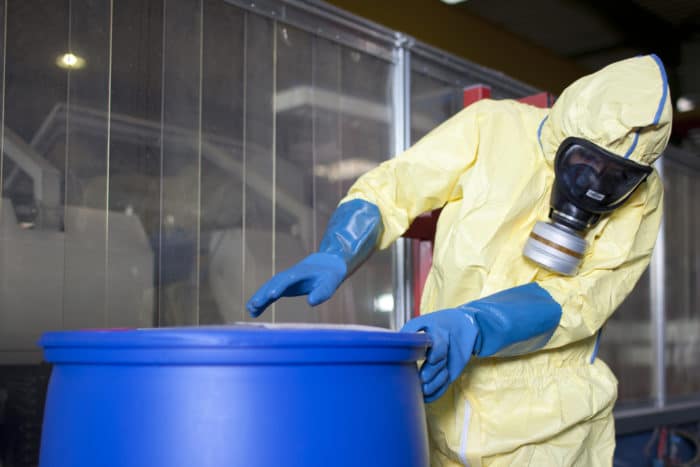Why We Love It
-
$71,790Potential Avg. Salary
-
4%Job Growth Rate
-
Growing DemandJob Outlook
-
Don't Take Work HomeCareer Attribute
Industrial Hygienists are also known as occupational health and safety professionals. Their main purpose is to identify and prevent hazardous conditions in working environments. In this job role, you would use evidence-based approaches and scientific know-how to bring about solutions for eliminating or controlling occupational hazards.
Recommended Schools
What is an Industrial Hygienist?
Duties
In particular, industrial hygienists are highly trained experts at recognizing health hazards pertaining to the workplace, such as paint or glue vapours, pesticides, wood dust and solvent, asbestos, lead, etc. There are certain tasks that fall upon an industrial hygienist, which includes those listed below:
- Efficiently utilise specialized equipment such as ventilation testing equipment and scientific instruments to measure various health hazards, such as airborne contaminants or noise
- Support government officials and health committees by participating in the development of new strategies, to reduce the safety risks of workers and their families
- Conduct site monitoring and put forward corrective action steps in compliance with state and federal health rules and regulations
- Make sure that personal protective equipment is available, inventoried and in working condition for specific employee roles
- Monitor risk assessment reports and other scientific research to provide data on possible hazards in the workplace
Day in the life
The tasks that an industrial hygienist undertakes will vary by type of industry, workplace, and hazards that employees are exposed to. One of the major responsibilities an industrial hygienist has is to thoroughly examine the workplace for environmental or physical factors that could affect employee health, safety, and output.
As an industrial hygienist, you might take into account factors such as lighting, equipment, materials and ventilation to anticipate possible hazards that may arise. You will also have the opportunity to develop and conduct employee safety and training programs. Such programs can cover a wide range of topics, such as how to use safety equipment effectively and how to respond in an emergency setting.
In order to ensure that building safety is maintained, they may have to collaborate with other experts such as engineers and physicians to control hazardous conditions or equipment.
Work schedule and typical hours
The majority of occupational health and safety specialists, including certified industrial hygienists, work full-time. Hours may include evenings, weekends, and nights, especially during times of crisis.
As an industrial hygiene professional, one might have to travel frequently to sites and work in a wide range of environments, both indoors and out. As such, you are expected to work on the road, in the field, and in the office. This job carries some risks, so hygienists are required to use protective clothing, gear, and equipment to keep themselves safe.
Growth of the job
Employment of occupational health and safety specialists is projected to grow 4 percent from 2014 to 2024. Despite slower-than-average employment growth, openings for individuals with advanced degrees are projected to be positive. Candidates who possess certification will likely enjoy more job opportunities. In the future, technological advances will result in the use of newly developed machinery, and specialists will be needed to create such equipment, and establish procedures to ensure certain safety protocols.
Typical employers
As per the latest statistics, 18% of industrial hygienists work for the state and local government. They often perform field work and travel as government inspectors tasked with ensuring workplace safety standards are maintained by businesses and individuals, including the safe use of hazardous materials.
Other employers include government agencies such as the military forces or CDC, universities and colleges, public utility companies, occupational health and safety consulting firms, civic buildings and scientific research institutes. In addition, factories and mines have one of the highest risks to health and safety, requiring a large number of industrial hygienist tasked with employee safety and protection.
Recommended Schools
How To Become an Industrial Hygienist
To work as an industrial hygienist, you must have at least a bachelor’s degree in relevant fields like engineering, chemistry, or physics from an accredited college or university. While a master’s degree is not essential, those without advanced degrees will find it a struggle to compete with fellow applicants possessing better credentials. Completing an internship, or co-op position can be another good way to gain leverage as an aspiring industrial hygienist.
The American Board of Industrial Hygiene (ABIH) has specific requirements regarding coursework that students must take in order to become a Certified Industrial Hygienist (CIH). No matter what their college major, you must take 180 academic contact hours of specific industrial hygiene courses to be certified. Typical coursework may include hazardous material management and control, risk communications and respiratory protection.
Industrial Hygienist Salary Data
We’ve provided you the following to learn more about this career. The salary and growth data on this page comes from recently published Bureau of Labor Statistics data while the recommendations and editorial content are based on our research.
National Anual Salary
Low Range
$53,890Average
$71,790High Range
$102,980National Hourly Wage
Low Range
$26/hrAverage
$35/hrHigh Range
$50/hrHow do Industrial Hygienist salaries stack up to other jobs across the country? Based on the latest jobs data nationwide, Industrial Hygienist's can make an average annual salary of $71,790, or $35 per hour. On the lower end, they can make $53,890 or $26 per hour, perhaps when just starting out or based on the state you live in.
Salary Rankings And Facts
#186 Nationally for All Careers
Above Average Salary Nationally
Highest Education Among Industrial Hygienists
- 2.5% Doctorate
- 22% Masters
- 35.6% Bachelors
- 9.3% Associates
- 18% College
- 10% High School
- 2.6% Less than High School
Job Growth Projections and Forecast
2014 Total Jobs
70,3002024 Est. Jobs
73,100Job Growth Rate
4%Est. New Jobs
2,800How does Industrial Hygienist job growth stack up to other jobs across the country? By 2024, there will be a change of 2,800 jobs for a total of 73,100 people employed in the career nationwide. This is a 4% change in growth over the next ten years, giving the career a growth rate nationwide of Above Average.
Growth Rankings And Facts
#480 Nationally for All Careers
Above Avg. Growth Nationally
What Companies Employ The Most Industrial Hygienists
| Industry | Current Jobs | New Jobs Needed | % Increase |
|---|---|---|---|
| Federal government, excluding postal service | 7,400 | -700 | -1% |
| State government, excluding education and hospitals | 6,600 | 100 | 0% |
| Local government, excluding education and hospitals | 6,000 | 300 | 0% |
Similar Careers
-
Clinical Psychologist
-
Behavior Analyst
-
Speech Language Pathology Assistant (SLPA)
-
Anger Management Therapist
-
Medical Social Worker
-
Orientation and Mobility Specialist
-
Industrial Organizational Psychologist (IO)
-
Grief Counselor
-
Vocational Psychologist
-
Clinical or Psychiatric Social Worker
-
Marriage and Family Therapist (MFT)
-
Clinical Social Worker













